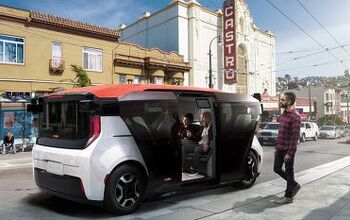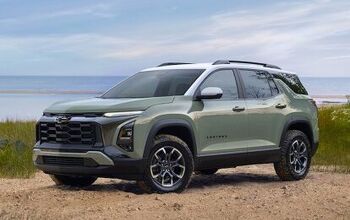Self-driving Company Waymo to Buy Thousands of High-end, Sporty Jaguar EVs for Taxi Service

Let’s hope future robo-taxi passengers appreciate a sport-tuned suspension and crisp driving dynamics, because there’s a slim chance they’ll notice it when shuttling around in a driverless Jaguar.
On Tuesday, Waymo, autonomous car unit of Google, announced its intent to purchase up to 20,000 Jaguar I-Pace electric crossovers for its future fleet of AV EVs. Fitted with an array of self-driving hardware and software, Waymo says the cars will hit the road in 2020. Testing begins this year, which has us wondering what kind of wait a regular I-Pace customer faces.
News of this bulk buy comes two months after Waymo’s decision to purchase “thousands” of hybrid Chrysler Pacifica minivans for its autonomous ride-hailing fleet. Fiat Chrysler and Waymo entered into an agreement long ago (in AV terms), with testing now ongoing on public roads in numerous cities. Phoenix, Arizona is the site of the company’s Early Rider test program, in which the public can summon and ride in a driverless Pacifica.
Later this year, Phoenix will serve as the launch site for the company’s commercial ride-hailing service, featuring completely driver-free cab rides for paying customers. Phoenix, of course, is a market that’s very unlikely to see snow or rain obscure road boundaries, painted markers, street signs, and the like.
So far, Waymo hasn’t seen a tragedy like that experienced by Uber last week, and, ulike Uber, the company has voluntarily submitted information to the National Highway Traffic Safety Administration to document its progress.
The deal between Waymo and Jaguar, which carries an undisclosed price (it’s estimated at $1 billion or more — the I-Pace’s profit margin is unknown and Jag won’t want to take a hit), will see the two companies collaborate on the vehicle’s production at the factory level. Self-driving I-Pace models will roll out of the assembly plant with everything needed to enter driverless taxi duty, rather than seeing them shipped to Waymo for outfitting. The two companies claim up to 20,000 of the specialized I-Paces will be built in the first two years of production.
The Jaguar I-Pace, which starts at $69,500 (USD), boasts approximately 240 miles of range from its 90 kWh battery pack. Two electric motors positioned front and rear combine for an output of 394 horsepower and 512 lb-ft of torque — more than enough motivation for sedate, follow-the-rules taxi service. It seem like overkill, given the car’s intended use, but Waymo has global domination in mind here. Jaguar not only has the brand recognition, but also the cash, suppliers, and facility to churn out I-Paces at a reliable clip.
Orders for retail customers began earlier this month, and the first I-Paces should enter driveways by the middle of this year.
[Images: Waymo, Jaguar Land Rover]

More by Steph Willems
Latest Car Reviews
Read moreLatest Product Reviews
Read moreRecent Comments
- Theflyersfan I used to love the 7-series. One of those aspirational luxury cars. And then I parked right next to one of the new ones just over the weekend. And that love went away. Honestly, if this is what the Chinese market thinks is luxury, let them have it. Because, and I'll be reserved here, this is one butt-ugly, mutha f'n, unholy trainwreck of a design. There has to be an excellent car under all of the grotesque and overdone bodywork. What were they thinking? Luxury is a feeling. It's the soft leather seats. It's the solid door thunk. It's groundbreaking engineering (that hopefully holds up.) It's a presence that oozes "I have arrived," not screaming "LOOK AT ME EVERYONE!!!" The latter is the yahoo who just won $1,000,000 off of a scratch-off and blows it on extra chrome and a dozen light bars on a new F150. It isn't six feet of screens, a dozen suspension settings that don't feel right, and no steering feel. It also isn't a design that is going to be so dated looking in five years that no one is going to want to touch it. Didn't BMW learn anything from the Bangle-butt backlash of 2002?
- Theflyersfan Honda, Toyota, Nissan, Hyundai, and Kia still don't seem to have a problem moving sedans off of the lot. I also see more than a few new 3-series, C-classes and A4s as well showing the Germans can sell the expensive ones. Sales might be down compared to 10-15 years ago, but hundreds of thousands of sales in the US alone isn't anything to sneeze at. What we've had is the thinning of the herd. The crap sedans have exited stage left. And GM has let the Malibu sit and rot on the vine for so long that this was bound to happen. And it bears repeating - auto trends go in cycles. Many times the cars purchased by the next generation aren't the ones their parents and grandparents bought. Who's to say that in 10 years, CUVs are going to be seen at that generation's minivans and no one wants to touch them? The Japanese and Koreans will welcome those buyers back to their full lineups while GM, Ford, and whatever remains of what was Chrysler/Dodge will be back in front of Congress pleading poverty.
- Corey Lewis It's not competitive against others in the class, as my review discussed. https://www.thetruthaboutcars.com/cars/chevrolet/rental-review-the-2023-chevrolet-malibu-last-domestic-midsize-standing-44502760
- Turbo Is Black Magic My wife had one of these back in 06, did a ton of work to it… supercharger, full exhaust, full suspension.. it was a blast to drive even though it was still hilariously slow. Great for drive in nights, open the hatch fold the seats flat and just relax.Also this thing is a great example of how far we have come in crash safety even since just 2005… go look at these old crash tests now and I cringe at what a modern electric tank would do to this thing.
- MaintenanceCosts Whenever the topic of the xB comes up…Me: "The style is fun. The combination of the box shape and the aggressive detailing is very JDM."Wife: "Those are ghetto."Me: "They're smaller than a Corolla outside and have the space of a RAV4 inside."Wife: "Those are ghetto."Me: "They're kind of fun to drive with a stick."Wife: "Those are ghetto."It's one of a few cars (including its fellow box, the Ford Flex) on which we will just never see eye to eye.



































Comments
Join the conversation
You’ve got to give Jaguar some credit here. They look like a modern and innovative car maker yet have a tremendous sporting pedigree. BMW and co look soooo last year!
So Jaguar I-pace is a new Town Car now? The reason Google chose Jaguar is that is is reliable, very durable and cheap to repair.